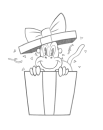Use the provided ape footage in the "Study from Life - Ape Reference Videos" lesson group to do some sketching of your own.
Make sure not to “pause” the footage as you will lose all sense of movement when studying from a static image. Each clip is set to loop 10 times, but feel free to replay them as much as needed.
Extra Credit: Using what you learned from studying live footage, draw some ape poses out of your head (memory sketching).
Memory sketching will help with several areas of your development
Highlight what you need to work on in your observational skills and understanding of the subject
Surprised yourself on what you actually obtained and learned
Become inventive in your realistic posing leading to more successful concept creature designs in your personal and professional body of work






